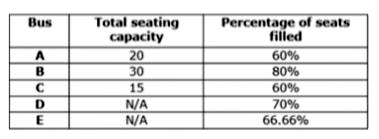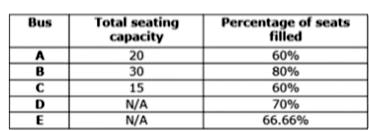A school group charters three identical buses and occupies 45 of the seats. After a 14 of the passengers leave, the remaining passengers use only two of the buses. The fraction of the seats on the two buses that are now occupied is
89
710
79
910
The correct Answer is:D
Step by step video, text & image solution for A school group charters three identical buses and occupies (4)/(5) of the seats. After a (1)/(4) of the passengers leave, the remaining passengers use only two of the buses. The fraction of the seats on the two buses that are now occupied is by Maths experts to help you in doubts & scoring excellent marks in Class 14 exams.
Updated on:21/07/2023Topper's Solved these Questions
- NUMBER SYSTEMBook:KIRAN PUBLICATIONChapter:NUMBER SYSTEMExercise:TYPE-VII
Explore 98 Videos
- NUMBER SYSTEMBook:KIRAN PUBLICATIONChapter:NUMBER SYSTEMExercise:TEST YOURSELF
Explore 25 Videos
- NUMBER SYSTEMBook:KIRAN PUBLICATIONChapter:NUMBER SYSTEMExercise:TYPE-V
Explore 21 Videos
- MISCELLANEOUSBook:KIRAN PUBLICATIONChapter:MISCELLANEOUSExercise:TYPE-VI
Explore 15 Videos
- PERCENTAGE Book:KIRAN PUBLICATIONChapter:PERCENTAGE Exercise:TEST YOURSELF
Explore 23 Videos
Similar Questions
Directions: In the question given below a statements is followed by three courses of action numbered I or (A), II or (B) and III or (C). A course of action is a step or administrative decision to be taken for improvement, follow-up for further action in regards to the problem, policy etc. on the basis of the information given in the statement. you have to assume everything in the statement to be true, then decide which of the three given/suggested courses of action logically follows for pursuing and decide the answer.
Statement :The recent landmark decision in which the court has put a ban of the playing of thousands of diesel buses that have no converted to CNG ,has created a great problem to commuters in city X.
Course of action :I. The government should make it mandatory for private vehicles to ferry -passenger sat a change in city X.
II.The government should draw up a contingency plan to tackle the transport problem in the court to allow it to phase out diesel buses gradually .
1) Only I follow 2) Only II follow
3)Only either I or II follow
4) All follow
5) None of these
View SolutionA Public transport corporation has hired 1,000 buses for the different routes for the passengers of metropolitan city. Most of the 3,000 crewmen(drivers, conductors, helpers etc). Of these buses have been found to be unsatisfactorily dealing with public and daily commuters. They seem to be little interesetd in the job and the jobs and the seem to have lost all meaning to them. As manager of the public transport what financial and non-financial incentive will you use to improve the working of crewman in question? State any two of each type of incentives.
View Solution
Knowledge Check
A school group charters three identical buses and occupies 45 of the seats. After a 14 of the passengers leave, the remaining passengers use only two of the buses. The fraction of the seats on the two buses that are now occupied is
A89B79C710D910In a car with seating capacity of exactly five persons, two persons can occupy the front seat and three persons can occupy the black seat. If amongst the seven persons, who wish to travel by this car, only two of them know driving then number of ways in which the car can be fully occupied and driven by them, is :
A360B60C240D7204 boys and 2 girls occupy seats in a row at random. Then , the probability that the two girls occupy seats side by side is
A12B14C13D16
In this question below is given a statement followed by two assumptions numbered I and II.Consider the statement and decide which of the given assumption in implicit.
Give answer (a) if only assumption I is implicit : (b) if only assumption II is implicit: (c) If either I or II is implicit: (d) If neither I nor II is implicit and (e) If both I and II are implicit.
Statement : The city bus transport corporation has decided to change routes of three buses plying between points A and B in the city to make them economically viable.
Assumption I. These buses may get more passengers on the revised routes.
II. Many people residing on the old routes may not avail bus services.
View SolutionStudy the given information carefully and answer the questions that follow.
The table given below shows the capacity of 5 buses (A, B, C, D, E) and the percentage of seats that were filled out of the total seating capacity of the buses.

Some of the data is missing and is denoted as N/A
A) The total number fo vacant seats in all the 5 nuses together were 40
B) The number of seats in buses D and E together were 65
20% of the passengers on bus D got down at Yarivali bus stop and 2 passengers boarded the bus from the same bus stop. The conductor started charging from Yarivali bus stop. The number of adults and children on he bus were in the ratio 2:1. If the total collection of bus fare was Rs. 800, what was the bus fare for each child? Consider, there were no other stoppages till the final stop, The bus ticket was free till Yarivali bus stop and children's tricket price was half of that of adult.
View SolutionThere are five students S1,S2,S3,S4 and R5 arranged in a row, where initially the seat R1is allotted to the students are randomly allotted the five seats R1,R2,R3,R4 and R6 arranged in a row, where initially the seat Ri is allotted to the student Sii,=1,2,3,4,5.But,ontheexaminationday,thefivestudentsarerandomlyalloedthefiveseats.<br>(TherearetwoquestionsbasedonParagraph,thequestiongivenbelowiso≠ofthem)<br>Theprobabilitytˆ,ontheexaminationday,thestudentS_(1)≥tsthepreviouslyalloedseatR_(1), and NONE of the remaining students gets the seat previously allotted to him/her is
View SolutionStudy the given information carefully and answer the questions that follow.
The table given below shows the capacity of 5 buses (A, B, C, D, E) and the percentage of seats that were filled out of the total seating capacity of the buses.

Some of the data is missing and is denoted as N/A
A) The total number fo vacant seats in all the 5 nuses together were 40
B) The number of seats in buses D and E together were 65
If 20% of the seats in bus E were occupied by people aging above 60, 40% were occupied by females and 50% were occupied by males aging below 60, what was the number of seats occupied by females aging above 60?
View SolutionFlights A and B are scheduled from an airport within the nextone hour. All the booked passengers of the two flights are waiting in the boarding hall after check-in. The hall has a seating capacity of 200, out of which 10% remained vacant. 40% of the waiting passengers are ladies. When boarding announcements came, passengers of flight A left the hall and boarded the flight. Seating capacity of each flight is two-third of the passengers who waited in the waiting hall for both the flights put together. Half the passengers who boarded flight A are women. After boarding for flight A, 60% of the waiting hall seats became empty. For every twenty of those who are still waiting in the hall for flight B, there is one air hostess in flight A. Then, what is the ratio of empty seats in flight B to number of air hostesses in flight A?
View Solution
